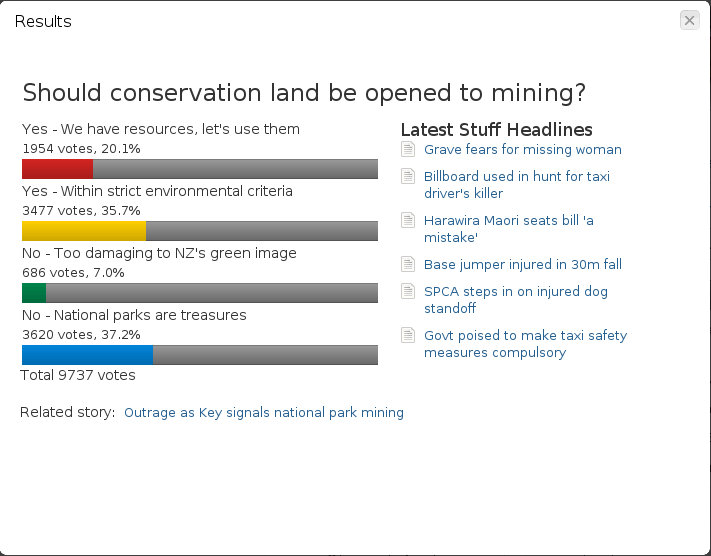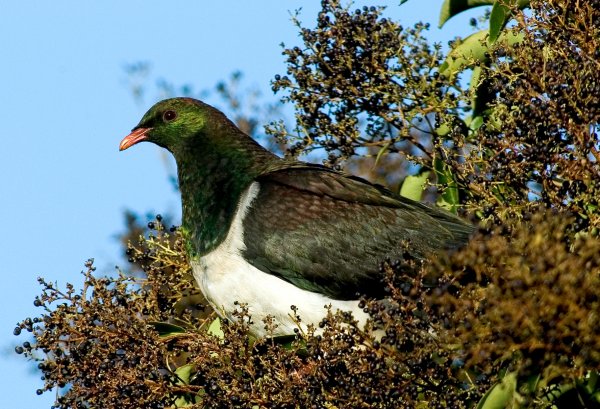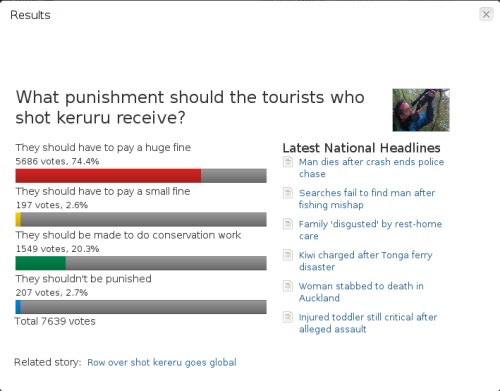There’s been much analysis, wisdom, whimsy, and snark about Gerry Brownlee’s plans to mine the conservation estate. But rather than talk about it, I’m going to repair to a rather dubious poll from stuff.co.nz:

Two things are interesting about this poll. First, for an internet poll, the options are uncharacteristically nuanced. This leads to the second interesting thing: these results are deeply incoherent.
I’m going to work from two assumptions (both of which are pretty arguable). First, I’m going to go out on a limb and assume that stuff.co.nz poll respondents are pretty similar to NZ Herald poll respondents and the commenters on “Your Views” and Stuff’s equivalent — putting it very charitably, let’s just suppose that they’re somewhat further economically to the right, less environmentally conscious and with stronger authoritarian tendencies than Gerry Brownlee. Second, I’m going to assume that a poll like this should break roughly along partisan lines, since it’s a government policy opposed by the opposition, part of an overall strategy to mimic Australia, a complex topic of national significance with which people generally have little first-hand experience (the sort of thing they tend to entrust to their representatives), and the poll answers are heavily propagandised using the government and opposition’s own sorts of terms.
The poll result is incoherent because it doesn’t break along (rightward-slanted) partisan lines, although it initially looks like it does. A total of about 56% of respondents approve of mining in principle, and this is roughly what I would expect given this framing, the current government position on the topic, and the demographic characteristics of this type of poll. It’s what the government is banking on in terms of support with this policy: if it drops much lower, they’ll probably back down. But where it gets incoherent is in the other two options. The third option (“too damaging to NZ’s green image”) is about what the Green party is polling, and the fourth (“National Parks are treasures”) is about what the Labour party wishes it was polling. That’s bass-ackwards, because the third option is the Labour party’s actual position on many environmental matters (even Carol Beaumont’s passionately-titled post falls back on NZ Inc. reasoning), while the fourth position is the Green party’s actual deeply-held position of principle. A second source of incoherence is the political framing of the second (most popular) question. By definition, if conservation land is mined it’s not being conserved any more.
Both Labour and the Greens have huge opportunities here, but they need to position themselves to properly take advantage of them. Labour, for its part, needs to tone back the NZ Inc. reasoning which plays into all the assumptions of the second question: that it is a simple trade-off of one type of economic value against another type and come out looking good on the margin. This is classic trickle-up politics, rationale which appeals to the brain instead of the gut. The people who are picking options one and two probably think they’re doing so on solid rational bases: more money, more efficient use of resources, etc. — but the real reasons are probably more to do with ideology (mastery of the environment) and nationalism (catching up with Australia). Labour’s best move here is to appeal to peoples’ identity: New Zealanders think of themselves as people who live in a wild and pristine country, and they like having that country to go and ramble about in (even if they hardly ever do it). The Greens could also adopt such a position, abandoning the wonkery for things which matter to people. Russel Norman tried with his speech in reply yesterday, but I swear, whoever wrote it needs the ‘G’, ‘D’ and ‘P’ keys removed from their keyboard. He needs to take a few hints from the team who got an organic farmer elected to the Senate in Montana on an environmentalist platform by telling him to stop talking about environmentalism and start talking about how much he loved the land. The Greens also need to rethink their deeply confused firearm policy, but that’s a minor thing. In a country with such a strong constituency of outdoorsfolk and wilderness sportspeople it’s an absolute travesty that the MP who represents the hunting lobby is the urbane Peter Dunne, and the only party who genuinely values wild places is represented by earnest city-dwelling vegetarians.
But Labour and the Greens can’t divide this constituency between them; they need to make this appeal positive-sum, and steal back some of those who voted option two. The way to do this is to attack the implicit logic of option two, the idea that you can mine something and still be conserving it, and to remove the idea that this sort of thing is for a government to decide, that it’s somehow too complex or technical for ordinary people to understand. This shouldn’t be hard to do — it’s a plain old political education campaign. But it requires framing and a narrative whereby reasonable people can really only bring themselves to choose the wilderness; causing them to lose faith in the assurances of the government’s “strict environmental criteria”. The narrative needs to be about who we are in New Zealand, and it needs to be one which appeals to socially-conservative rural and suburban folk who would never think of voting for earnest city-dwelling vegetarians even though they share many of the same bedrock values. It needs to be like the lyric in the title: we are burning our furniture, and that’s not what civilised people do. New Zealand is not a nation of environmental degenerates, except when insufferable environmentalist smugness forces them to choose degeneracy as the less-bad identity position.
This is an issue on which the left can win, because it’s already a pretty marginal issue for the government. It cuts against a long-standing bipartisan reverence for National Parks, and it cuts against New Zealand identity as New Zealanders see it. Even on what should be a pretty reactionary online poll, the government only wins by 6%. Turn one in six of those people around and the issue gets put on ice for good.
L




